Essay: Self-Development of Leadership Style and Emotional Intelligence
VerifiedAdded on 2020/05/11
|9
|2220
|360
Essay
AI Summary
This essay delves into the self-development of leadership style, emphasizing the critical role of emotional intelligence in addressing disorganized behavior. The author identifies disorganized behavior as a significant challenge and explores strategies to improve emotional intelligence, including self-awareness, self-regulation, social skills, empathy, and motivation. The essay highlights the importance of emotional intelligence in fostering innovation, dealing with uncertainty, and connecting with followers on an emotional level. It discusses the author's personal leadership plan, which focuses on building empathy, controlling emotional outbursts, and utilizing tools like personality tests and the Johari window for self-assessment. The essay underscores the benefits of enhanced emotional intelligence for both the leader and the followers, contributing to effective organizational management and long-term strategic planning. The author outlines various methods to develop emotional intelligence, such as enhancing interactions with others, participating in training sessions, and adopting monitoring techniques to assess progress. The essay concludes by emphasizing the transformative potential of emotional intelligence in leadership and its capacity to create a more reliable and trustworthy leader.
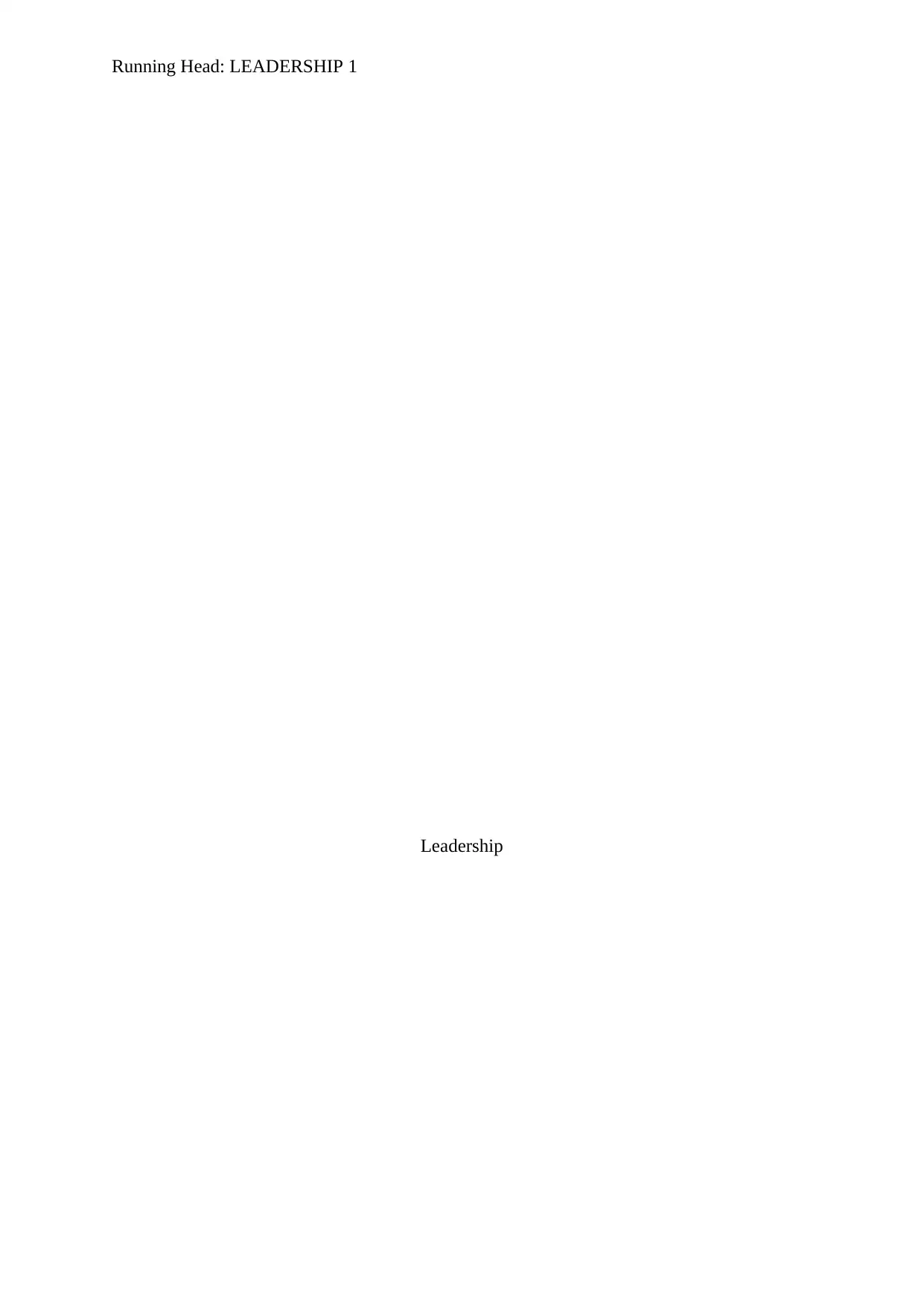
Running Head: LEADERSHIP 1
Leadership
Leadership
Paraphrase This Document
Need a fresh take? Get an instant paraphrase of this document with our AI Paraphraser
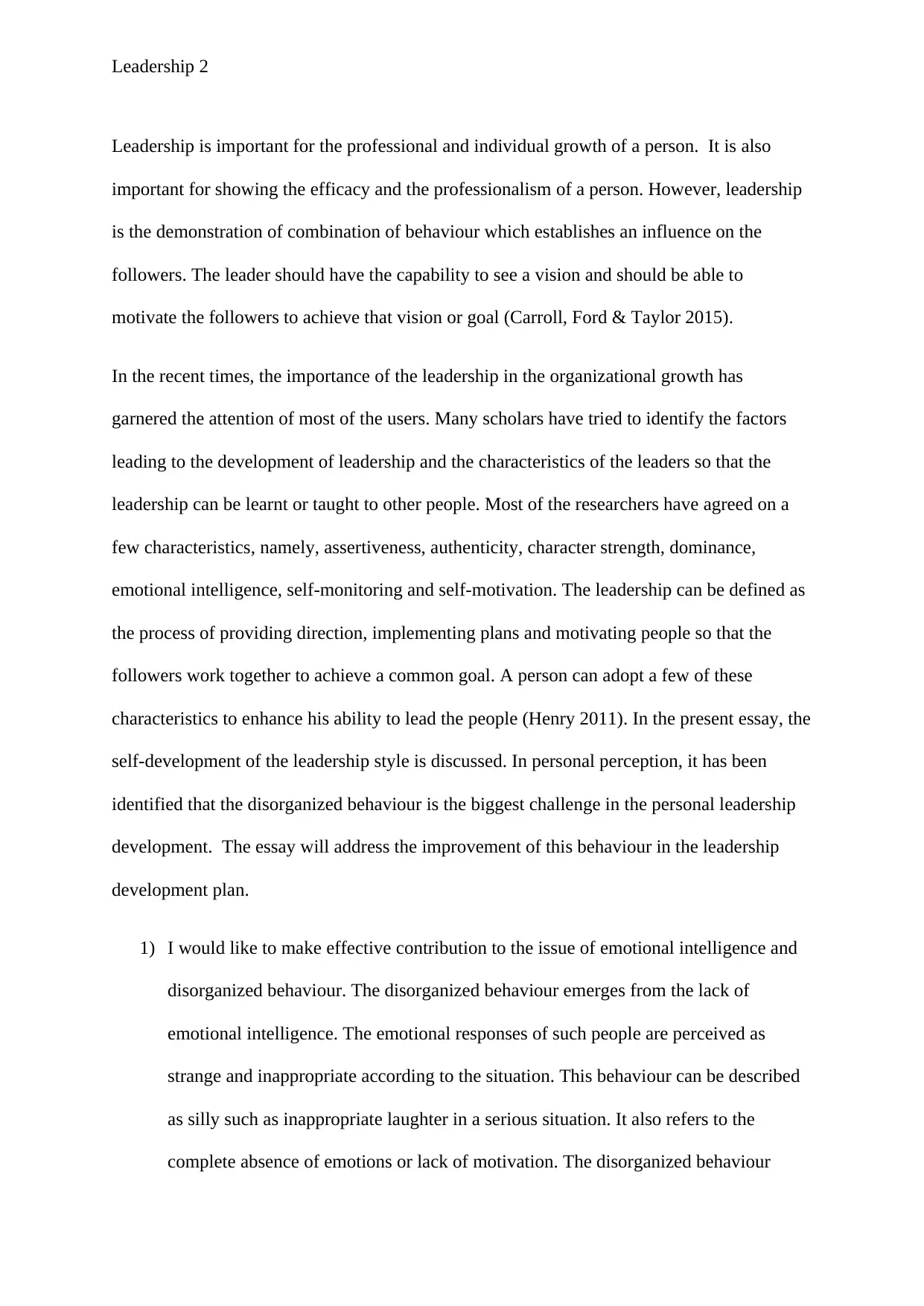
Leadership 2
Leadership is important for the professional and individual growth of a person. It is also
important for showing the efficacy and the professionalism of a person. However, leadership
is the demonstration of combination of behaviour which establishes an influence on the
followers. The leader should have the capability to see a vision and should be able to
motivate the followers to achieve that vision or goal (Carroll, Ford & Taylor 2015).
In the recent times, the importance of the leadership in the organizational growth has
garnered the attention of most of the users. Many scholars have tried to identify the factors
leading to the development of leadership and the characteristics of the leaders so that the
leadership can be learnt or taught to other people. Most of the researchers have agreed on a
few characteristics, namely, assertiveness, authenticity, character strength, dominance,
emotional intelligence, self-monitoring and self-motivation. The leadership can be defined as
the process of providing direction, implementing plans and motivating people so that the
followers work together to achieve a common goal. A person can adopt a few of these
characteristics to enhance his ability to lead the people (Henry 2011). In the present essay, the
self-development of the leadership style is discussed. In personal perception, it has been
identified that the disorganized behaviour is the biggest challenge in the personal leadership
development. The essay will address the improvement of this behaviour in the leadership
development plan.
1) I would like to make effective contribution to the issue of emotional intelligence and
disorganized behaviour. The disorganized behaviour emerges from the lack of
emotional intelligence. The emotional responses of such people are perceived as
strange and inappropriate according to the situation. This behaviour can be described
as silly such as inappropriate laughter in a serious situation. It also refers to the
complete absence of emotions or lack of motivation. The disorganized behaviour
Leadership is important for the professional and individual growth of a person. It is also
important for showing the efficacy and the professionalism of a person. However, leadership
is the demonstration of combination of behaviour which establishes an influence on the
followers. The leader should have the capability to see a vision and should be able to
motivate the followers to achieve that vision or goal (Carroll, Ford & Taylor 2015).
In the recent times, the importance of the leadership in the organizational growth has
garnered the attention of most of the users. Many scholars have tried to identify the factors
leading to the development of leadership and the characteristics of the leaders so that the
leadership can be learnt or taught to other people. Most of the researchers have agreed on a
few characteristics, namely, assertiveness, authenticity, character strength, dominance,
emotional intelligence, self-monitoring and self-motivation. The leadership can be defined as
the process of providing direction, implementing plans and motivating people so that the
followers work together to achieve a common goal. A person can adopt a few of these
characteristics to enhance his ability to lead the people (Henry 2011). In the present essay, the
self-development of the leadership style is discussed. In personal perception, it has been
identified that the disorganized behaviour is the biggest challenge in the personal leadership
development. The essay will address the improvement of this behaviour in the leadership
development plan.
1) I would like to make effective contribution to the issue of emotional intelligence and
disorganized behaviour. The disorganized behaviour emerges from the lack of
emotional intelligence. The emotional responses of such people are perceived as
strange and inappropriate according to the situation. This behaviour can be described
as silly such as inappropriate laughter in a serious situation. It also refers to the
complete absence of emotions or lack of motivation. The disorganized behaviour
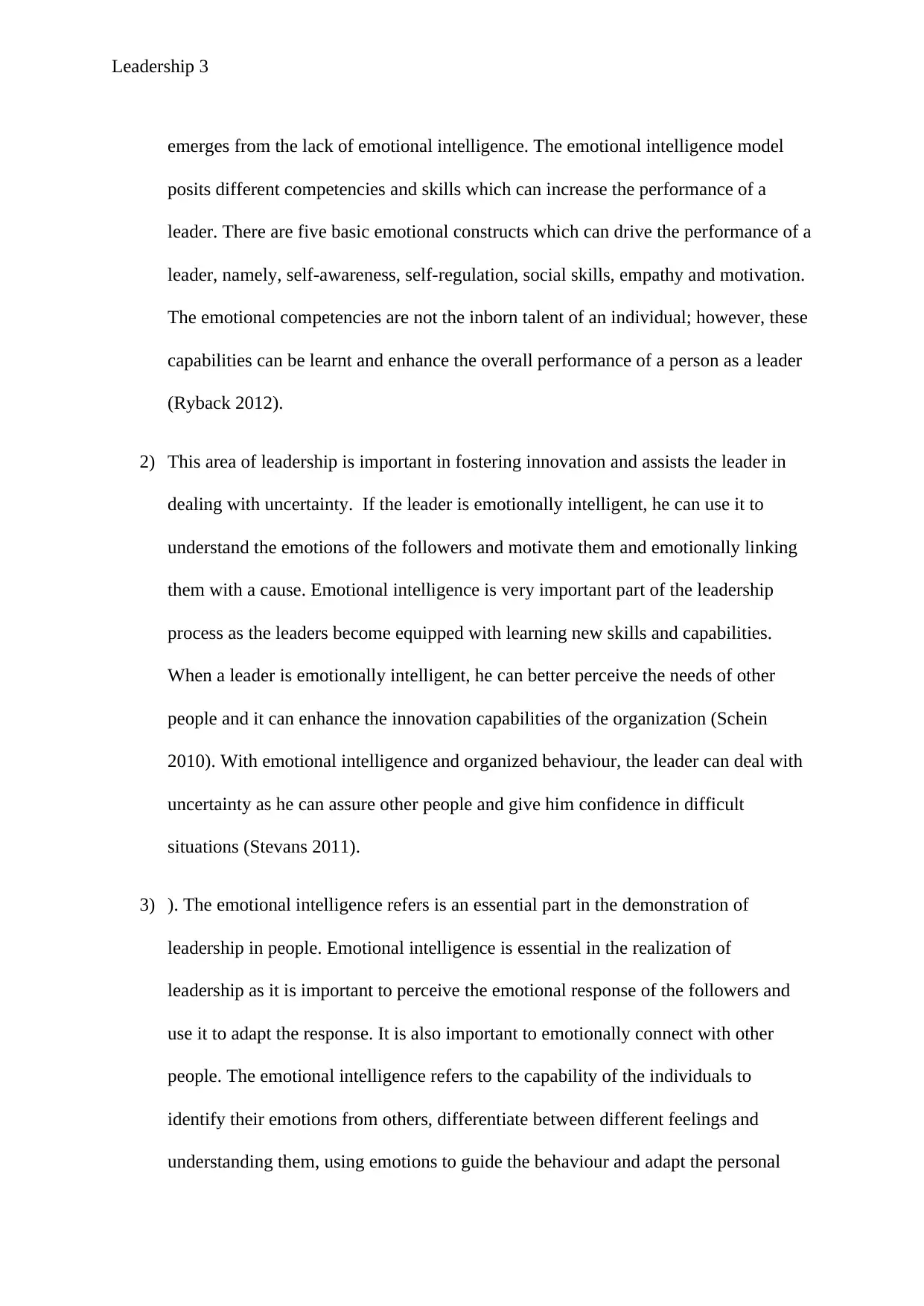
Leadership 3
emerges from the lack of emotional intelligence. The emotional intelligence model
posits different competencies and skills which can increase the performance of a
leader. There are five basic emotional constructs which can drive the performance of a
leader, namely, self-awareness, self-regulation, social skills, empathy and motivation.
The emotional competencies are not the inborn talent of an individual; however, these
capabilities can be learnt and enhance the overall performance of a person as a leader
(Ryback 2012).
2) This area of leadership is important in fostering innovation and assists the leader in
dealing with uncertainty. If the leader is emotionally intelligent, he can use it to
understand the emotions of the followers and motivate them and emotionally linking
them with a cause. Emotional intelligence is very important part of the leadership
process as the leaders become equipped with learning new skills and capabilities.
When a leader is emotionally intelligent, he can better perceive the needs of other
people and it can enhance the innovation capabilities of the organization (Schein
2010). With emotional intelligence and organized behaviour, the leader can deal with
uncertainty as he can assure other people and give him confidence in difficult
situations (Stevans 2011).
3) ). The emotional intelligence refers is an essential part in the demonstration of
leadership in people. Emotional intelligence is essential in the realization of
leadership as it is important to perceive the emotional response of the followers and
use it to adapt the response. It is also important to emotionally connect with other
people. The emotional intelligence refers to the capability of the individuals to
identify their emotions from others, differentiate between different feelings and
understanding them, using emotions to guide the behaviour and adapt the personal
emerges from the lack of emotional intelligence. The emotional intelligence model
posits different competencies and skills which can increase the performance of a
leader. There are five basic emotional constructs which can drive the performance of a
leader, namely, self-awareness, self-regulation, social skills, empathy and motivation.
The emotional competencies are not the inborn talent of an individual; however, these
capabilities can be learnt and enhance the overall performance of a person as a leader
(Ryback 2012).
2) This area of leadership is important in fostering innovation and assists the leader in
dealing with uncertainty. If the leader is emotionally intelligent, he can use it to
understand the emotions of the followers and motivate them and emotionally linking
them with a cause. Emotional intelligence is very important part of the leadership
process as the leaders become equipped with learning new skills and capabilities.
When a leader is emotionally intelligent, he can better perceive the needs of other
people and it can enhance the innovation capabilities of the organization (Schein
2010). With emotional intelligence and organized behaviour, the leader can deal with
uncertainty as he can assure other people and give him confidence in difficult
situations (Stevans 2011).
3) ). The emotional intelligence refers is an essential part in the demonstration of
leadership in people. Emotional intelligence is essential in the realization of
leadership as it is important to perceive the emotional response of the followers and
use it to adapt the response. It is also important to emotionally connect with other
people. The emotional intelligence refers to the capability of the individuals to
identify their emotions from others, differentiate between different feelings and
understanding them, using emotions to guide the behaviour and adapt the personal
⊘ This is a preview!⊘
Do you want full access?
Subscribe today to unlock all pages.

Trusted by 1+ million students worldwide
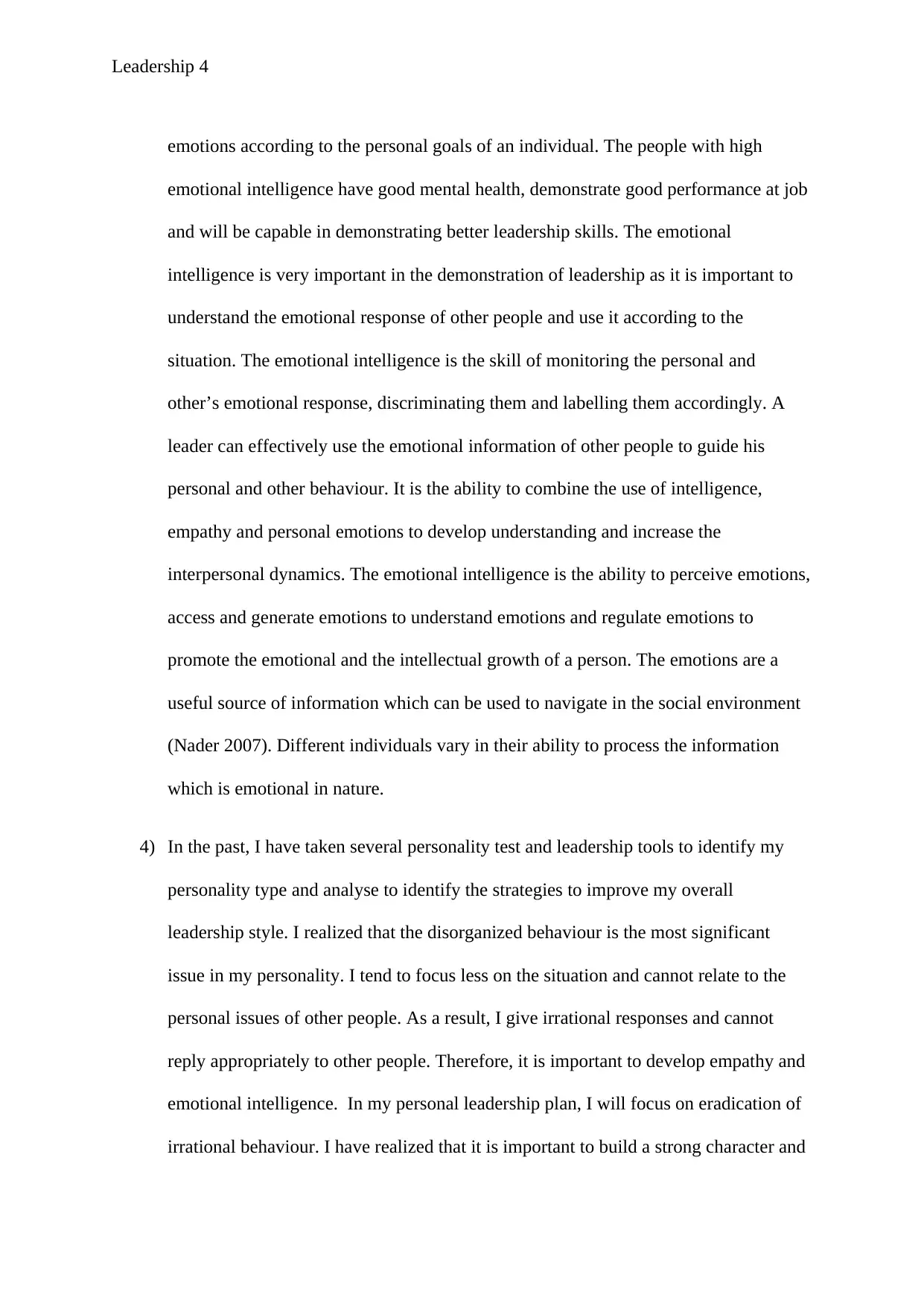
Leadership 4
emotions according to the personal goals of an individual. The people with high
emotional intelligence have good mental health, demonstrate good performance at job
and will be capable in demonstrating better leadership skills. The emotional
intelligence is very important in the demonstration of leadership as it is important to
understand the emotional response of other people and use it according to the
situation. The emotional intelligence is the skill of monitoring the personal and
other’s emotional response, discriminating them and labelling them accordingly. A
leader can effectively use the emotional information of other people to guide his
personal and other behaviour. It is the ability to combine the use of intelligence,
empathy and personal emotions to develop understanding and increase the
interpersonal dynamics. The emotional intelligence is the ability to perceive emotions,
access and generate emotions to understand emotions and regulate emotions to
promote the emotional and the intellectual growth of a person. The emotions are a
useful source of information which can be used to navigate in the social environment
(Nader 2007). Different individuals vary in their ability to process the information
which is emotional in nature.
4) In the past, I have taken several personality test and leadership tools to identify my
personality type and analyse to identify the strategies to improve my overall
leadership style. I realized that the disorganized behaviour is the most significant
issue in my personality. I tend to focus less on the situation and cannot relate to the
personal issues of other people. As a result, I give irrational responses and cannot
reply appropriately to other people. Therefore, it is important to develop empathy and
emotional intelligence. In my personal leadership plan, I will focus on eradication of
irrational behaviour. I have realized that it is important to build a strong character and
emotions according to the personal goals of an individual. The people with high
emotional intelligence have good mental health, demonstrate good performance at job
and will be capable in demonstrating better leadership skills. The emotional
intelligence is very important in the demonstration of leadership as it is important to
understand the emotional response of other people and use it according to the
situation. The emotional intelligence is the skill of monitoring the personal and
other’s emotional response, discriminating them and labelling them accordingly. A
leader can effectively use the emotional information of other people to guide his
personal and other behaviour. It is the ability to combine the use of intelligence,
empathy and personal emotions to develop understanding and increase the
interpersonal dynamics. The emotional intelligence is the ability to perceive emotions,
access and generate emotions to understand emotions and regulate emotions to
promote the emotional and the intellectual growth of a person. The emotions are a
useful source of information which can be used to navigate in the social environment
(Nader 2007). Different individuals vary in their ability to process the information
which is emotional in nature.
4) In the past, I have taken several personality test and leadership tools to identify my
personality type and analyse to identify the strategies to improve my overall
leadership style. I realized that the disorganized behaviour is the most significant
issue in my personality. I tend to focus less on the situation and cannot relate to the
personal issues of other people. As a result, I give irrational responses and cannot
reply appropriately to other people. Therefore, it is important to develop empathy and
emotional intelligence. In my personal leadership plan, I will focus on eradication of
irrational behaviour. I have realized that it is important to build a strong character and
Paraphrase This Document
Need a fresh take? Get an instant paraphrase of this document with our AI Paraphraser
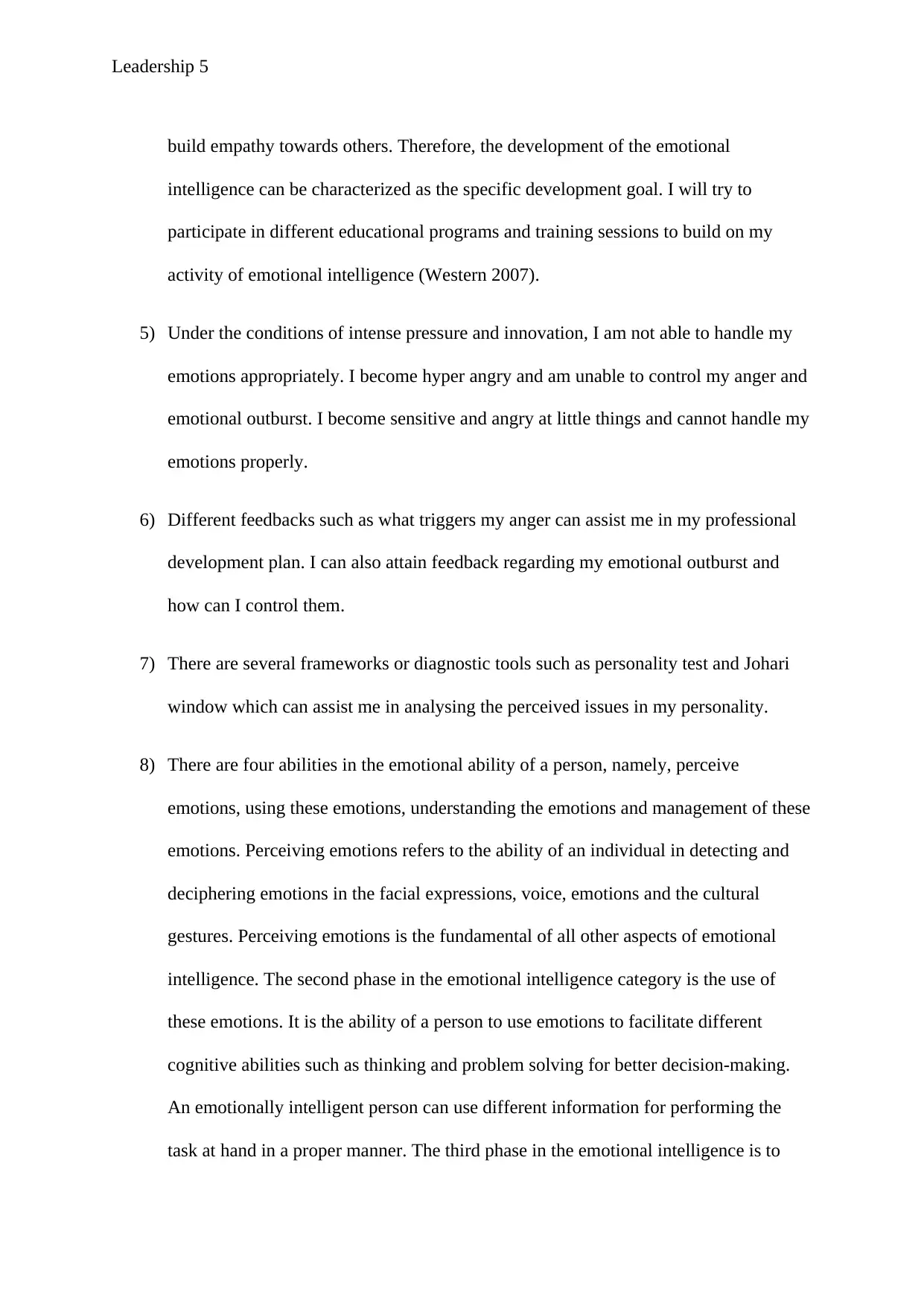
Leadership 5
build empathy towards others. Therefore, the development of the emotional
intelligence can be characterized as the specific development goal. I will try to
participate in different educational programs and training sessions to build on my
activity of emotional intelligence (Western 2007).
5) Under the conditions of intense pressure and innovation, I am not able to handle my
emotions appropriately. I become hyper angry and am unable to control my anger and
emotional outburst. I become sensitive and angry at little things and cannot handle my
emotions properly.
6) Different feedbacks such as what triggers my anger can assist me in my professional
development plan. I can also attain feedback regarding my emotional outburst and
how can I control them.
7) There are several frameworks or diagnostic tools such as personality test and Johari
window which can assist me in analysing the perceived issues in my personality.
8) There are four abilities in the emotional ability of a person, namely, perceive
emotions, using these emotions, understanding the emotions and management of these
emotions. Perceiving emotions refers to the ability of an individual in detecting and
deciphering emotions in the facial expressions, voice, emotions and the cultural
gestures. Perceiving emotions is the fundamental of all other aspects of emotional
intelligence. The second phase in the emotional intelligence category is the use of
these emotions. It is the ability of a person to use emotions to facilitate different
cognitive abilities such as thinking and problem solving for better decision-making.
An emotionally intelligent person can use different information for performing the
task at hand in a proper manner. The third phase in the emotional intelligence is to
build empathy towards others. Therefore, the development of the emotional
intelligence can be characterized as the specific development goal. I will try to
participate in different educational programs and training sessions to build on my
activity of emotional intelligence (Western 2007).
5) Under the conditions of intense pressure and innovation, I am not able to handle my
emotions appropriately. I become hyper angry and am unable to control my anger and
emotional outburst. I become sensitive and angry at little things and cannot handle my
emotions properly.
6) Different feedbacks such as what triggers my anger can assist me in my professional
development plan. I can also attain feedback regarding my emotional outburst and
how can I control them.
7) There are several frameworks or diagnostic tools such as personality test and Johari
window which can assist me in analysing the perceived issues in my personality.
8) There are four abilities in the emotional ability of a person, namely, perceive
emotions, using these emotions, understanding the emotions and management of these
emotions. Perceiving emotions refers to the ability of an individual in detecting and
deciphering emotions in the facial expressions, voice, emotions and the cultural
gestures. Perceiving emotions is the fundamental of all other aspects of emotional
intelligence. The second phase in the emotional intelligence category is the use of
these emotions. It is the ability of a person to use emotions to facilitate different
cognitive abilities such as thinking and problem solving for better decision-making.
An emotionally intelligent person can use different information for performing the
task at hand in a proper manner. The third phase in the emotional intelligence is to
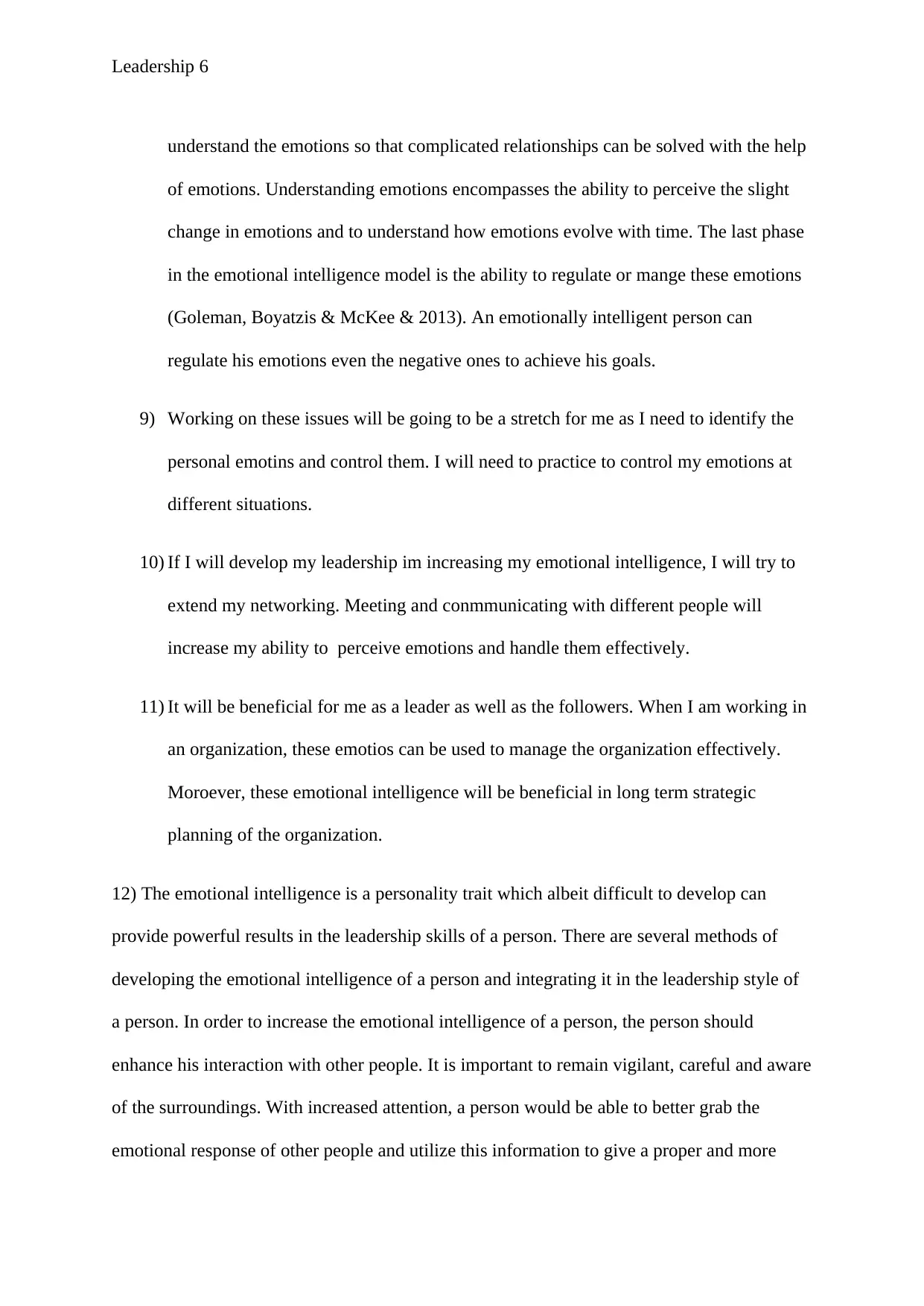
Leadership 6
understand the emotions so that complicated relationships can be solved with the help
of emotions. Understanding emotions encompasses the ability to perceive the slight
change in emotions and to understand how emotions evolve with time. The last phase
in the emotional intelligence model is the ability to regulate or mange these emotions
(Goleman, Boyatzis & McKee & 2013). An emotionally intelligent person can
regulate his emotions even the negative ones to achieve his goals.
9) Working on these issues will be going to be a stretch for me as I need to identify the
personal emotins and control them. I will need to practice to control my emotions at
different situations.
10) If I will develop my leadership im increasing my emotional intelligence, I will try to
extend my networking. Meeting and conmmunicating with different people will
increase my ability to perceive emotions and handle them effectively.
11) It will be beneficial for me as a leader as well as the followers. When I am working in
an organization, these emotios can be used to manage the organization effectively.
Moroever, these emotional intelligence will be beneficial in long term strategic
planning of the organization.
12) The emotional intelligence is a personality trait which albeit difficult to develop can
provide powerful results in the leadership skills of a person. There are several methods of
developing the emotional intelligence of a person and integrating it in the leadership style of
a person. In order to increase the emotional intelligence of a person, the person should
enhance his interaction with other people. It is important to remain vigilant, careful and aware
of the surroundings. With increased attention, a person would be able to better grab the
emotional response of other people and utilize this information to give a proper and more
understand the emotions so that complicated relationships can be solved with the help
of emotions. Understanding emotions encompasses the ability to perceive the slight
change in emotions and to understand how emotions evolve with time. The last phase
in the emotional intelligence model is the ability to regulate or mange these emotions
(Goleman, Boyatzis & McKee & 2013). An emotionally intelligent person can
regulate his emotions even the negative ones to achieve his goals.
9) Working on these issues will be going to be a stretch for me as I need to identify the
personal emotins and control them. I will need to practice to control my emotions at
different situations.
10) If I will develop my leadership im increasing my emotional intelligence, I will try to
extend my networking. Meeting and conmmunicating with different people will
increase my ability to perceive emotions and handle them effectively.
11) It will be beneficial for me as a leader as well as the followers. When I am working in
an organization, these emotios can be used to manage the organization effectively.
Moroever, these emotional intelligence will be beneficial in long term strategic
planning of the organization.
12) The emotional intelligence is a personality trait which albeit difficult to develop can
provide powerful results in the leadership skills of a person. There are several methods of
developing the emotional intelligence of a person and integrating it in the leadership style of
a person. In order to increase the emotional intelligence of a person, the person should
enhance his interaction with other people. It is important to remain vigilant, careful and aware
of the surroundings. With increased attention, a person would be able to better grab the
emotional response of other people and utilize this information to give a proper and more
⊘ This is a preview!⊘
Do you want full access?
Subscribe today to unlock all pages.

Trusted by 1+ million students worldwide
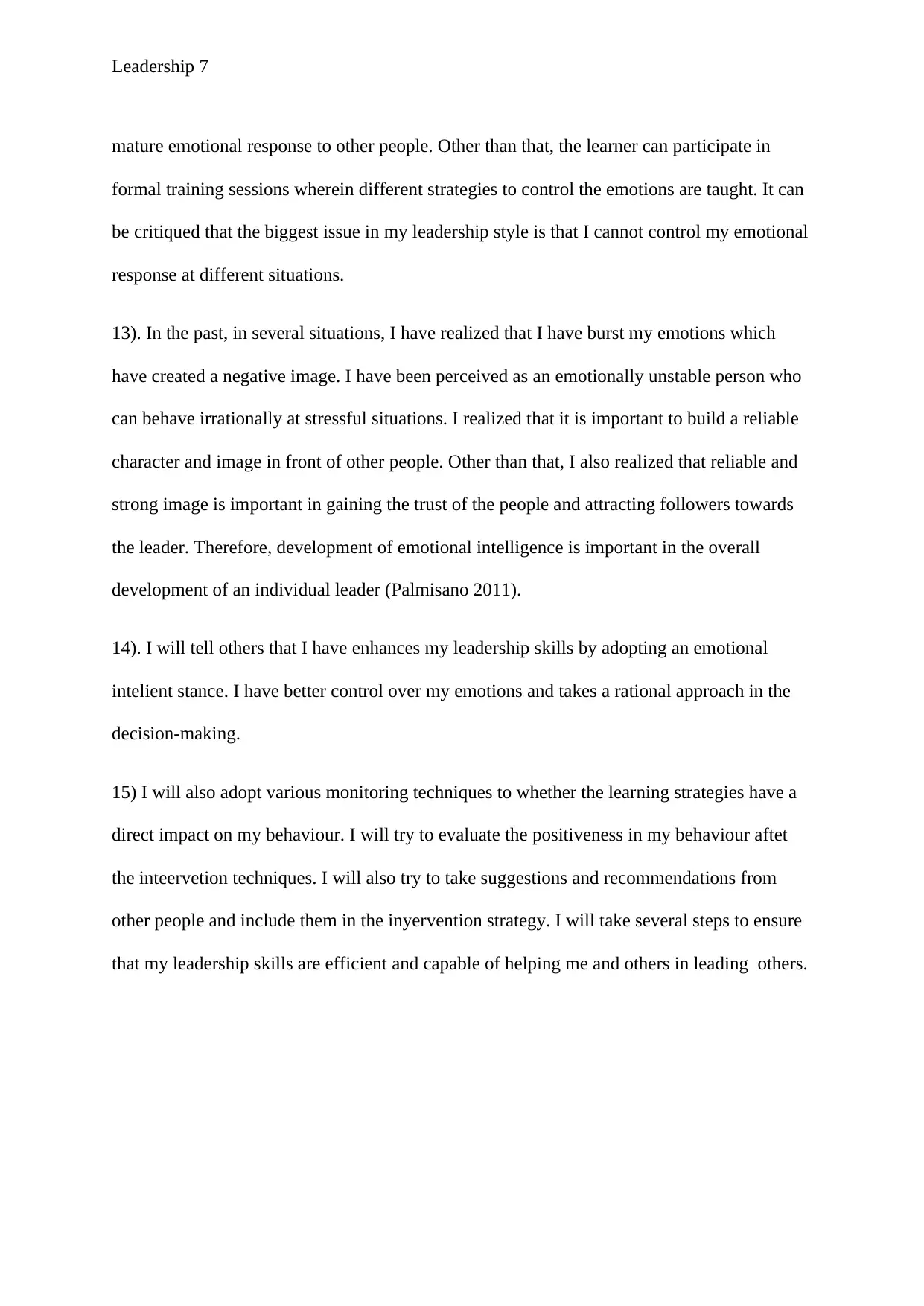
Leadership 7
mature emotional response to other people. Other than that, the learner can participate in
formal training sessions wherein different strategies to control the emotions are taught. It can
be critiqued that the biggest issue in my leadership style is that I cannot control my emotional
response at different situations.
13). In the past, in several situations, I have realized that I have burst my emotions which
have created a negative image. I have been perceived as an emotionally unstable person who
can behave irrationally at stressful situations. I realized that it is important to build a reliable
character and image in front of other people. Other than that, I also realized that reliable and
strong image is important in gaining the trust of the people and attracting followers towards
the leader. Therefore, development of emotional intelligence is important in the overall
development of an individual leader (Palmisano 2011).
14). I will tell others that I have enhances my leadership skills by adopting an emotional
intelient stance. I have better control over my emotions and takes a rational approach in the
decision-making.
15) I will also adopt various monitoring techniques to whether the learning strategies have a
direct impact on my behaviour. I will try to evaluate the positiveness in my behaviour aftet
the inteervetion techniques. I will also try to take suggestions and recommendations from
other people and include them in the inyervention strategy. I will take several steps to ensure
that my leadership skills are efficient and capable of helping me and others in leading others.
mature emotional response to other people. Other than that, the learner can participate in
formal training sessions wherein different strategies to control the emotions are taught. It can
be critiqued that the biggest issue in my leadership style is that I cannot control my emotional
response at different situations.
13). In the past, in several situations, I have realized that I have burst my emotions which
have created a negative image. I have been perceived as an emotionally unstable person who
can behave irrationally at stressful situations. I realized that it is important to build a reliable
character and image in front of other people. Other than that, I also realized that reliable and
strong image is important in gaining the trust of the people and attracting followers towards
the leader. Therefore, development of emotional intelligence is important in the overall
development of an individual leader (Palmisano 2011).
14). I will tell others that I have enhances my leadership skills by adopting an emotional
intelient stance. I have better control over my emotions and takes a rational approach in the
decision-making.
15) I will also adopt various monitoring techniques to whether the learning strategies have a
direct impact on my behaviour. I will try to evaluate the positiveness in my behaviour aftet
the inteervetion techniques. I will also try to take suggestions and recommendations from
other people and include them in the inyervention strategy. I will take several steps to ensure
that my leadership skills are efficient and capable of helping me and others in leading others.
Paraphrase This Document
Need a fresh take? Get an instant paraphrase of this document with our AI Paraphraser
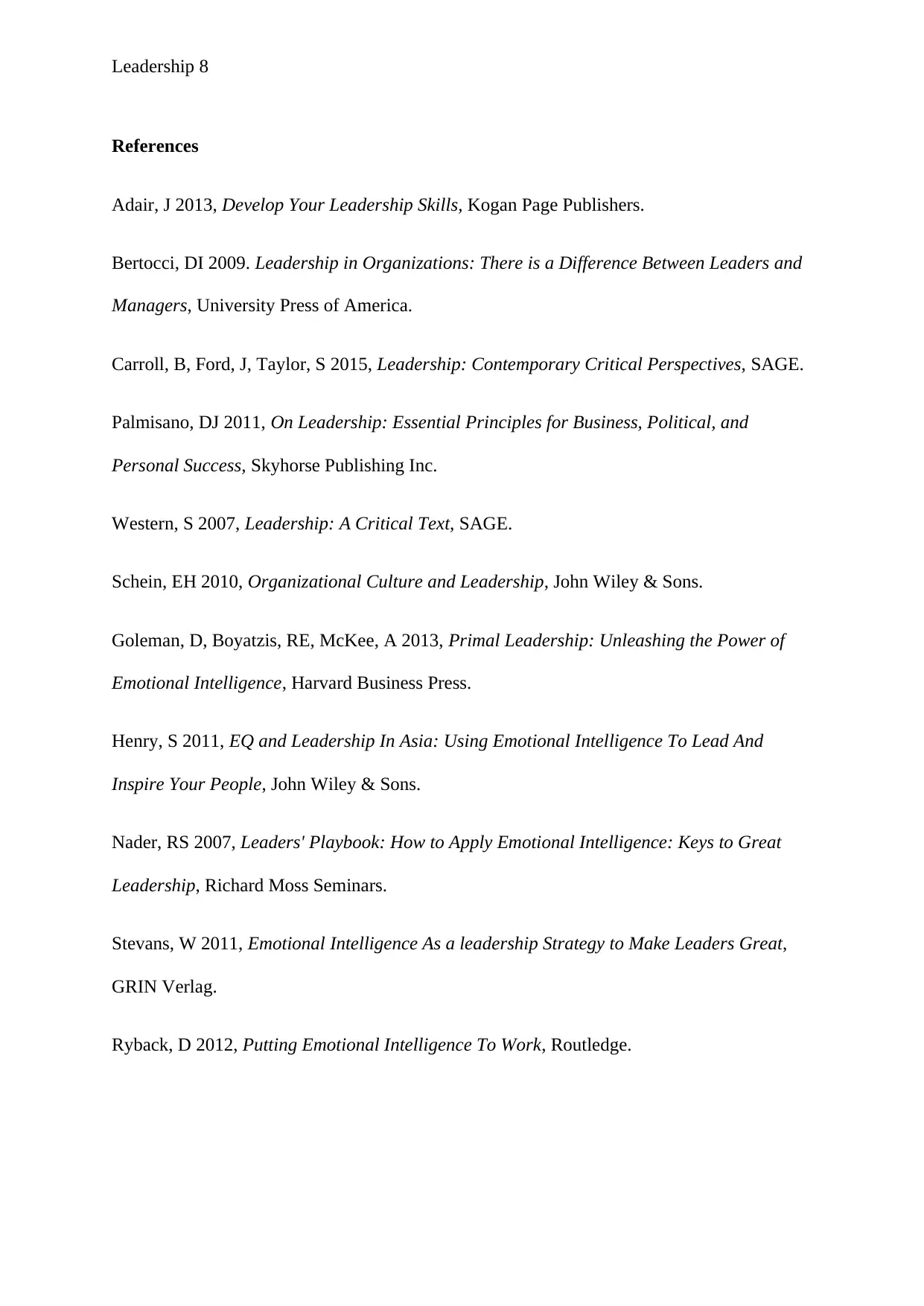
Leadership 8
References
Adair, J 2013, Develop Your Leadership Skills, Kogan Page Publishers.
Bertocci, DI 2009. Leadership in Organizations: There is a Difference Between Leaders and
Managers, University Press of America.
Carroll, B, Ford, J, Taylor, S 2015, Leadership: Contemporary Critical Perspectives, SAGE.
Palmisano, DJ 2011, On Leadership: Essential Principles for Business, Political, and
Personal Success, Skyhorse Publishing Inc.
Western, S 2007, Leadership: A Critical Text, SAGE.
Schein, EH 2010, Organizational Culture and Leadership, John Wiley & Sons.
Goleman, D, Boyatzis, RE, McKee, A 2013, Primal Leadership: Unleashing the Power of
Emotional Intelligence, Harvard Business Press.
Henry, S 2011, EQ and Leadership In Asia: Using Emotional Intelligence To Lead And
Inspire Your People, John Wiley & Sons.
Nader, RS 2007, Leaders' Playbook: How to Apply Emotional Intelligence: Keys to Great
Leadership, Richard Moss Seminars.
Stevans, W 2011, Emotional Intelligence As a leadership Strategy to Make Leaders Great,
GRIN Verlag.
Ryback, D 2012, Putting Emotional Intelligence To Work, Routledge.
References
Adair, J 2013, Develop Your Leadership Skills, Kogan Page Publishers.
Bertocci, DI 2009. Leadership in Organizations: There is a Difference Between Leaders and
Managers, University Press of America.
Carroll, B, Ford, J, Taylor, S 2015, Leadership: Contemporary Critical Perspectives, SAGE.
Palmisano, DJ 2011, On Leadership: Essential Principles for Business, Political, and
Personal Success, Skyhorse Publishing Inc.
Western, S 2007, Leadership: A Critical Text, SAGE.
Schein, EH 2010, Organizational Culture and Leadership, John Wiley & Sons.
Goleman, D, Boyatzis, RE, McKee, A 2013, Primal Leadership: Unleashing the Power of
Emotional Intelligence, Harvard Business Press.
Henry, S 2011, EQ and Leadership In Asia: Using Emotional Intelligence To Lead And
Inspire Your People, John Wiley & Sons.
Nader, RS 2007, Leaders' Playbook: How to Apply Emotional Intelligence: Keys to Great
Leadership, Richard Moss Seminars.
Stevans, W 2011, Emotional Intelligence As a leadership Strategy to Make Leaders Great,
GRIN Verlag.
Ryback, D 2012, Putting Emotional Intelligence To Work, Routledge.
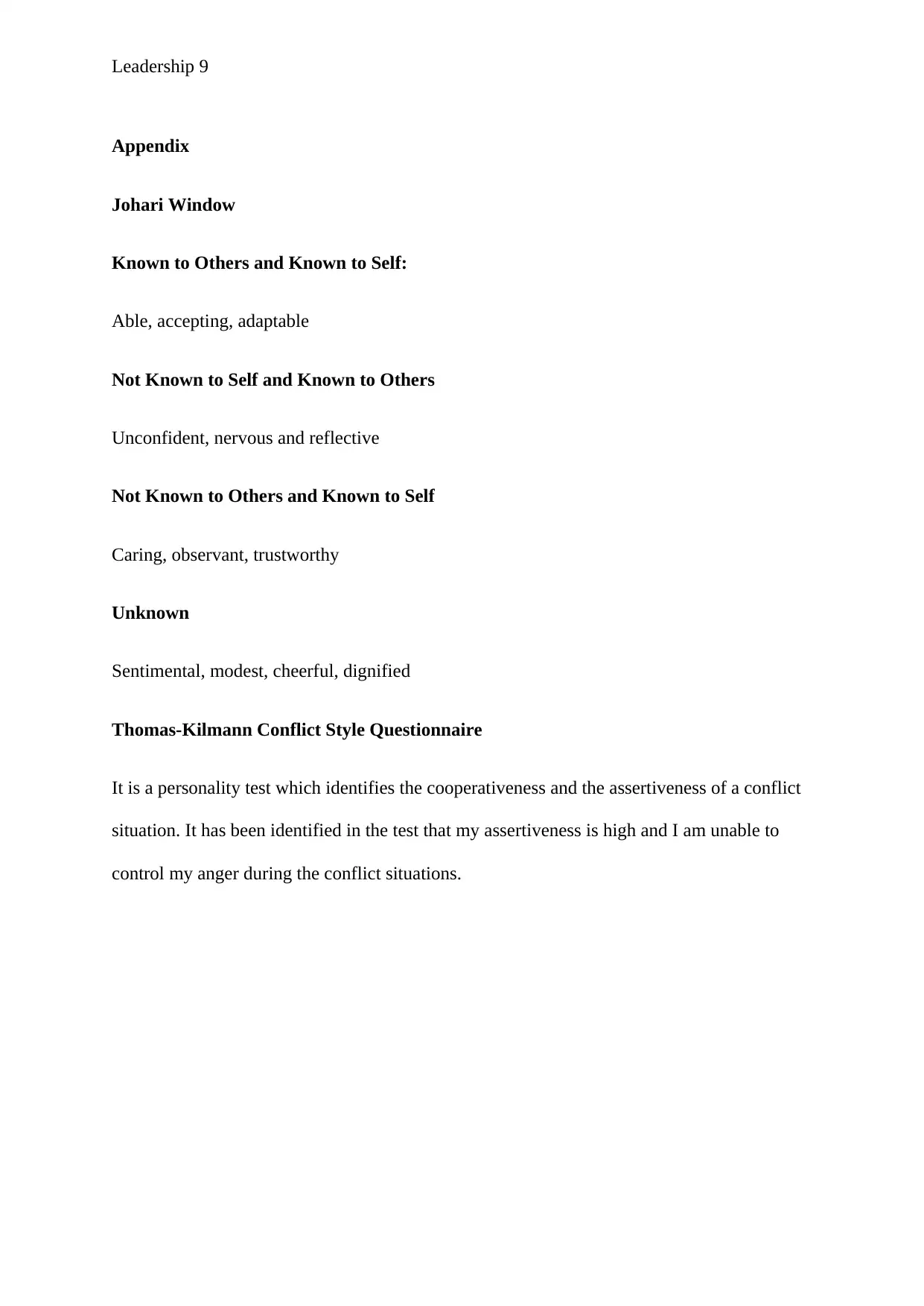
Leadership 9
Appendix
Johari Window
Known to Others and Known to Self:
Able, accepting, adaptable
Not Known to Self and Known to Others
Unconfident, nervous and reflective
Not Known to Others and Known to Self
Caring, observant, trustworthy
Unknown
Sentimental, modest, cheerful, dignified
Thomas-Kilmann Conflict Style Questionnaire
It is a personality test which identifies the cooperativeness and the assertiveness of a conflict
situation. It has been identified in the test that my assertiveness is high and I am unable to
control my anger during the conflict situations.
Appendix
Johari Window
Known to Others and Known to Self:
Able, accepting, adaptable
Not Known to Self and Known to Others
Unconfident, nervous and reflective
Not Known to Others and Known to Self
Caring, observant, trustworthy
Unknown
Sentimental, modest, cheerful, dignified
Thomas-Kilmann Conflict Style Questionnaire
It is a personality test which identifies the cooperativeness and the assertiveness of a conflict
situation. It has been identified in the test that my assertiveness is high and I am unable to
control my anger during the conflict situations.
⊘ This is a preview!⊘
Do you want full access?
Subscribe today to unlock all pages.

Trusted by 1+ million students worldwide
1 out of 9
Related Documents
Your All-in-One AI-Powered Toolkit for Academic Success.
+13062052269
info@desklib.com
Available 24*7 on WhatsApp / Email
![[object Object]](/_next/static/media/star-bottom.7253800d.svg)
Unlock your academic potential
Copyright © 2020–2026 A2Z Services. All Rights Reserved. Developed and managed by ZUCOL.





